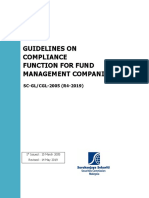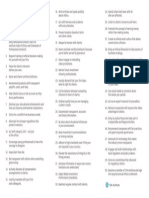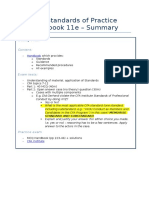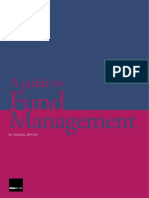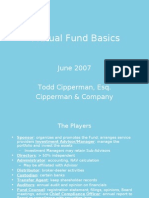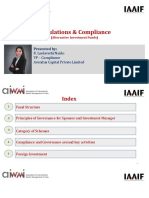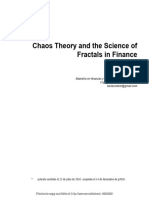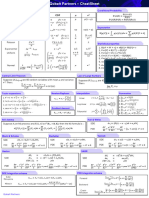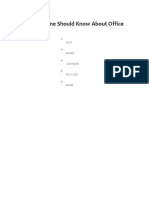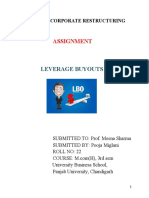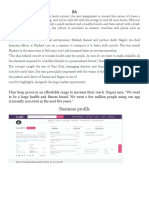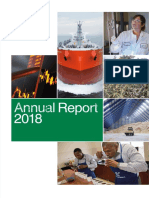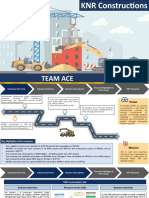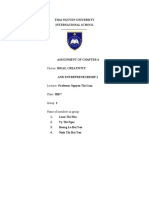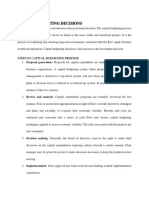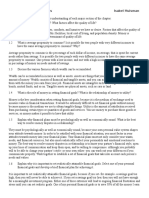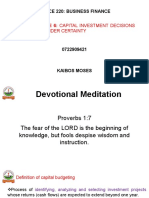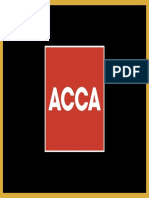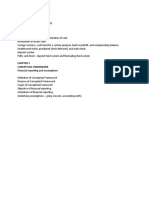ASSET MANAGER CODE
The CFA Institute Asset Manager Code™ outlines the ethical and professional
responsibilities of firms (“Managers”) that manage assets on behalf of clients. By adopting
and enforcing a code of conduct for their organizations, Managers demonstrate their
commitment to ethical behavior and the protection of investors’ interests.
GENERAL PRINCIPLES OF CONDUCT
Managers have the following responsibilities to their clients.
Managers must:
1. Act in a professional and ethical manner at all times. 4. Act with skill, competence, and diligence.
2. Act for the benefit of clients. 5. Communicate with clients in a timely and accurate manner.
3. Act with independence and objectivity. 6. Uphold the applicable rules governing capital markets.
ASSET MANAGER CODE
A. LOYALTY TO CLIENTS 5. When managing a portfolio or pooled fund according to a specific
Managers must: mandate, strategy, or style:
1. Place client interests before their own. a. Take only investment actions that are consistent with the
2. Preserve the confidentiality of information communicated by stated objectives and constraints of that portfolio or fund.
clients within the scope of the Manager–client relationship. b. Provide adequate disclosures and information so investors can
3. Refuse to participate in any business relationship or accept consider whether any proposed changes in the investment
any gift that could reasonably be expected to affect their style or strategy meet their investment needs.
independence, objectivity, or loyalty to clients. 6. When managing separate accounts and before providing
investment advice or taking investment action on behalf of
B. INVESTMENT PROCESS AND ACTIONS the client:
Managers must: a. Evaluate and understand the client’s investment objectives,
1. Use reasonable care and prudent judgment when managing tolerance for risk, time horizon, liquidity needs, financial
client assets. constraints, any unique circumstances (including tax
2. Not engage in practices designed to distort prices or considerations, legal or regulatory constraints, etc.), and any
artificially inflate trading volume with the intent to mislead other relevant information that would affect investment policy.
market participants. b. Determine that an investment is suitable to a client’s
3. Deal fairly and objectively with all clients when providing financial situation.
investment information, making investment recommendations,
or taking investment action.
4. Have a reasonable and adequate basis for investment decisions.
Continued
�C. TRADING F. DISCLOSURES
Managers must: Managers must:
1. Not act or cause others to act on material nonpublic information 1. Communicate with clients on an ongoing and timely basis.
that could affect the value of a publicly traded investment. 2. Ensure that disclosures are truthful, accurate, complete, and
2. Give priority to investments made on behalf of the client over understandable and are presented in a format that communicates
those that benefit the Managers’ own interests. the information effectively.
3. Use commissions generated from client trades to pay for only 3. Include any material facts when making disclosures or providing
investment-related products or services that directly assist the information to clients regarding themselves, their personnel,
Manager in its investment decision making process, and not in investments, or the investment process.
the management of the firm. 4. Disclose the following:
4. Maximize client portfolio value by seeking best execution for all a. Conflicts of interests generated by any relationships with
client transactions. brokers or other entities, other client accounts, fee structures,
5. Establish policies to ensure fair and equitable trade allocation or other matters.
among client accounts. b. Regulatory or disciplinary action taken against the Manager or
its personnel related to professional conduct.
D. RISK MANAGEMENT, COMPLIANCE, AND SUPPORT c. The investment process, including information regarding
Managers must: lock-up periods, strategies, risk factors, and use of derivatives
1. Develop and maintain policies and procedures to ensure that their and leverage.
activities comply with the provisions of this Code and all applicable d. Management fees and other investment costs charged to
legal and regulatory requirements. investors, including what costs are included in the fees and the
2. Appoint a compliance officer responsible for administering the methodologies for determining fees and costs.
policies and procedures and for investigating complaints regarding e. The amount of any soft or bundled commissions, the goods
the conduct of the Manager or its personnel. and/or services received in return, and how those goods and/or
3. Ensure that portfolio information provided to clients by the services benefit the client.
Manager is accurate and complete and arrange for independent f. The performance of clients’ investments on a regular and
third-party confirmation or review of such information. timely basis.
4. Maintain records for an appropriate period of time in an easily g. Valuation methods used to make investment decisions and
accessible format. value client holdings.
5. Employ qualified staff and sufficient human and technological h. Shareholder voting policies.
resources to thoroughly investigate, analyze, implement, and i. Trade allocation policies.
monitor investment decisions and actions. j. Results of the review or audit of the fund or account.
6. Establish a business-continuity plan to address disaster recovery k. Significant personnel or organizational changes that have
or periodic disruptions of the financial markets. occurred at the Manager.
7. Establish a firmwide risk management process that identifies, l. Risk management processes.
measures, and manages the risk position of the Manager and
its investments, including the sources, nature, and degree of
risk exposure.
E. PERFORMANCE AND VALUATION
NOTIFICATION OF COMPLIANCE
Managers must: Managers must notify CFA Institute of their claim of compliance
1. Present performance information that is fair, accurate, relevant, through the Asset Manager Code claim of compliance form at
timely, and complete. Managers must not misrepresent the www.cfainstitute.org/assetcode. This form is for communication
performance of individual portfolios or of their firm. and information-gathering purposes only and does not represent
2. Use fair-market prices to value client holdings and apply, in that CFA Institute engages in enforcement or quality control of an
good faith, methods to determine the fair value of any securities organization’s claim of compliance. CFA Institute does not verify
for which no independent, third-party market quotation is either the Manager’s claim of compliance or actual compliance
readily available. with the Code.
For additional information on complying, please visit
www.cfainstitute.org/assetcode.
www.cfainstitute.org
© 2020 CFA Institute. All rights reserved.









